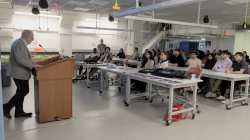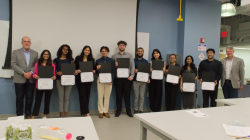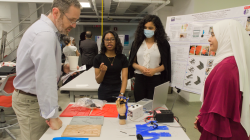Undergrad Program Overview
The BME undergraduate program attracts a strong and diverse student body, which includes a large number of CUNY honors scholars. We offer various research and minority scholarships and have obtained ABET accreditation. Our goal is to produce BME graduates who are well prepared for work in industry and entrance into graduate and medical school programs.
Program Mission
We strive to establish an enduring national urban model for Biomedical Engineering programs and a legacy of excellence in public higher education for future generations of students and faculty.
We strive for our undergraduate students to be well-grounded in the basic engineering principles found in traditional mechanical, chemical, and electrical engineering subjects. Our program also gives students a solid background in biology and physiology and an appreciation for the complexity of living systems. We provide undergraduates with relevant practical experience through the guidance of research-active faculty, Ph.D. student mentors, tutors, and industry internships.
Educational Objectives
Our objectives are to prepare graduates:
- For productive employment in biomedical and health related industry.
- To perform successfully in graduate school, medical school or professional programs.
- Who will ethically and responsibly apply their engineering talents for the benefit of society, demonstrating an integrated, multidisciplinary approach to problem solving.
- Who will continue to develop technical knowledge, awareness and leadership skills that will allow them to address domestic or global problems in human health.
Student Outcomes
- An ability to identify, formulate, and solve complex engineering problems by applying principles of engineering, science, and mathematics
- An ability to apply engineering design to produce solutions that meet specified needs with consideration of public health, safety, and welfare, as well as global, cultural, social, environmental, and economic factors
- An ability to communicate effectively with a range of audiences
- An ability to recognize ethical and professional responsibilities in engineering situations and make informed judgments, which must consider the impact of engineering solutions in global, economic, environmental, and societal contexts
- An ability to function effectively on a team whose members together provide leadership, create a collaborative and inclusive environment, establish goals, plan tasks, and meet objectives
- An ability to develop and conduct appropriate experimentation, analyze and interpret data, and use engineering judgment to draw conclusions
- An ability to acquire and apply new knowledge as needed, using appropriate learning strategies.
Enrollment and Graduation Data
|
|
Enrollment |
B.E. Graduates |
|
2002 |
16 |
N/A |
|
2003 |
53 |
N/A |
|
2004 |
105 |
N/A |
|
2005 |
121 |
N/A |
|
2006 |
131 |
14 |
|
2007 |
131 |
9 |
|
2008 |
138 |
35 |
|
2009 |
141 |
19 |
|
2010 |
176 |
11 |
|
2011 |
188 |
23 |
|
2012 |
214 |
16 |
|
2013 |
233 |
32 |
|
2014 |
246 |
23 |
|
2015 |
257 |
25 |
|
2016 |
262 |
42 |
|
2017 |
240 |
36 |
|
2018 |
209 |
58 |
|
2019 |
163 |
33 |
|
2020 |
143 |
38 |
|
2021 |
119 |
32 |
|
2022 |
117 |
31 |
|
2023 |
100 |
31 |
|
2024 |
90 |
24 |
|
2025 |
91 |
11 |
|
2026 |
|
|
|
2027 |
|
|
|
2028 |
|
Program Accreditation
The BE (BME) program is fully accredited by:
The Accreditation Board for Engineering and Technology (ABET)
The Engineering Accreditation Commission of ABET
111 Market Place, Suite 1050
Baltimore, MD 21202-4012
Our most recent accreditation was in 2023. This occurs every 6 years.
We were originally ABET accredited in 2011, again in 2017, and most recently in 2023 with no concerns.
Last Updated: 12/10/2025 12:09



